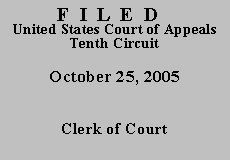

| CHRIS ALLEN BROWNFIELD, | No. 05-3210
(D.C. No. 05-3175-SAC) (D. Kan.) |
OF APPEALABILITY
In 1984, Brownfield escaped from prison in Oklahoma, where he was serving a twenty-year sentence. He fled to Kansas and was not caught until 1986, when he was arrested for committing felony murder and aggravated battery. He pled guilty to the charges as part of a plea agreement. In return, the state agreed not to oppose a transfer of Brownfield to Oklahoma for the concurrent service of his Kansas and Oklahoma sentences. The Kansas court that accepted the plea made clear, however, that it had no authority to require Oklahoma to impose its sentence concurrent with the Kansas sentence. Oklahoma did submit a detainer for Brownfield's arrest to the Kansas authorities but have not acted since doing so. There is nothing else in the record that indicates a desire or willingness on the part of Oklahoma to have him transferred to their prisons.
When he was not transferred to Oklahoma, Brownfield filed a 28 U.S.C. § 2254 petition, alleging a violation of his plea agreement. This court rejected his claim. Brownfield v. Hannigan, 1996 U.S. App. LEXIS 15811 (10th Cir. June 28, 1996) (unpublished). He later brought an action under 42 U.S.C. § 1983, claiming that Kansas violated his constitutional rights by failing to transfer him to an Oklahoma prison. Brownfield v. Stovall, 85 Fed. Appx. 123, 2003 U.S. App. LEXIS 26445 (10th Cir. December 30, 2003) (unpublished). This claim too was rejected.
Brownfield filed a § 2241 petition in the court below on April 8, 2005, claiming that his sentence was being executed incorrectly (i.e. he had not been transferred to Oklahoma) due to a typographical error in a Kansas state court journal entry. The district court dismissed his claim as time-barred. Brownfield applied for a COA, but the district court did not act. Under these circumstances, COA is deemed denied. See Tenth Circuit Emergency General Order issued Oct. 1, 1996. Browfield now seeks a COA from this court.(*)
It is undisputed that Brownfield's conviction was finalized before the passage of AEDPA. Pursuant to the limitations period established by that statute, Brownfield had until one year after AEDPA went into effect to file his petition. 28 U.S.C. § 2244(d)(1)(D). This means that Brownfield had to file his § 2241 petition on or before April 24, 1997. United States v. Hurst, 322 F.3d 1256 (10th Cir 2003) (holding that prisoners whose convictions became final on or before April 24, 1996 must file their habeas corpus petitions on or before April 24, 1997 in order to comply with AEDPA). He did not file his petition until April 13, 2005.
Brownfield argues that AEDPA's one-year statute of limitations does not apply to his petition. Instead, he argues that the court should apply Fed. R. Civ. P. 60(a), which permits any single judge to modify a clerical error at any time. This is wrong.(2) Section 2241 is the proper means by which state prisoners collaterally attack the execution of their sentences in federal court. Montez, 208 F.3d 862, 865 (10th Cir. 2000). Section 2241 has a one-year statute of limitations and Brownfield did not file his petition in that time frame. Further, he did not present any argument in favor of equitable tolling. Thus, his petition is time-barred.
For the reasons set forth above, Brownfield's request for a COA is DENIED and the appeal is DISMISSED.
ENTERED FOR THE COURT
Carlos F. Lucero
Circuit Judge
*. Brownfield's petition was filed after April 24, 1996, the effective date of the Antiterrorism and Effective Death Penalty Act ("AEDPA"); as a result, AEDPA's provisions apply to this case. See Rogers v. Gibson, 173 F.3d 1278, 1282 n.1 (10th Cir. 1999) (citing Lindh v. Murphy, 521 U.S. 320, 138 L. Ed. 2d 481, 117 S. Ct. 2059 (1997)). AEDPA conditions a petitioner's right to appeal a denial of habeas relief under § 2241 upon a grant of a COA. 28 U.S.C. § 2253(c)(1)(A); Montez v. McKinna, 208 F.3d 862 (10th Cir. 2000) (holding that § 2253(c)(1)(A) requires a state prisoner to obtain a COA regardless of whether he is seeking relief under § 2254 or under § 2241). A COA may be issued "only if the applicant has made a substantial showing of the denial of a constitutional right." § 2253(c)(2). This requires Brownfield to show "that reasonable jurists could debate whether (or, for that matter, agree that) the petition should have been resolved in a different manner or that the issues presented were adequate to deserve encouragement to proceed further." Slack v. McDaniel, 529 U.S. 473, 484 (2000) (quotations omitted). Because the district court did not grant a COA, Brownfield may not appeal the district court's decision absent a grant of a COA by this court.
2. Brownfield also files a separate motion for correction pursuant to Rule 60(a). Brownfield is challenging the execution of his sentence, which he can only do only under § 2241. His motion is therefore denied.